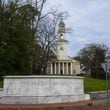Georgia has rejected a Ku Klux Klan group's application to adopt a one-mile stretch of highway in North Georgia, setting up a likely First Amendment court fight.
In statement released late Tuesday, state Department of Transportation officials said promoting "an organization with a history of inciting civil disturbance and social unrest would present a grave concern." Part of that concern, officials acknowledged, was that allowing the group to participate in the Adopt-a-Highway program could harm Georgia's image.
The DOT also argued that seeing signs bearing the Klan's name and encountering members of the KKK along a roadway "would create a definite distraction to motorists."
A phone call to International Keystone Knights of the KKK, which filed an application May 21 to adopt the portion of road in Union County, was not immediately returned. Harley Hanson, the exalted cyclops of the KKK Realm of Georgia, had earlier told the Atlanta Journal-Constitution he would file a lawsuit if the group's application was rejected.
The 34-year-old Blairsville electrician said the group's members were simply trying to contribute to their community and keep the mountainous region pristine. Critics accused them of seeking publicity and working to improve their image. Groups that "adopt" stretches of highway are acknowledged with a road sign promoting their volunteer work.
State Rep. Tyrone Brooks, head of the Georgia Association of Black Elected Officials, praised the state for making what he called the “only right decision.”
“The Klan killed people in this state, terrorized people in this state,” the Atlanta Democrat said. “For the state to sanction them as a civic-minded group would be unacceptable and dangerous.”
In Blairsville, a community in the Appalachian Mountains that relies heavily on tourism, the issue has been the talk of the town.
“Everyone’s talking about it,” said Richard Nguyen, owner of Lovely Nails, a salon.
“There are a lot of people who oppose it,” Nguyen said. “But I don’t see anything wrong with it. To me, free speech is free speech.”
Missouri fought a long legal battle to prohibit the KKK from adopting a portion of highway in that state -- a fight the state eventually lost. The U.S. Supreme Court declined to take up a lower court's ruling that the First Amendment barred Missouri from rejecting an applicant because it disagreed with their beliefs.
It is not known what a legal battle over the Klan's application might cost Georgia taxpayers.
State DOT officials reached their decision late Tuesday after consulting with Gov. Nathan Deal and the chairman of the state transportation board. Lawyers have been huddled behind closed doors since Monday, deciding how to handle the politically and legally sensitive matter.
Deal, a Republican, urged DOT Commissioner Keith Golden to reject the request. In an e-mail to Golden, Deal's chief of staff, Chris Riley, said the governor "does not support the approval of the application."
In their statement Tuesday, DOT officials said allowing the KKK to participate would "have the potential to negatively impact the quality of life, commerce and economic development of Union County and all of Georgia."
Georgia's "Adopt-a Highway" program began in 1989, enlisting volunteers to supplement state cleanup efforts. Each group agrees to remove litter at least four times a year for a two-year period.
There were 173 organizations involved in the statewide program in fiscal year 2011, encompassing more than 4,100 individual participants and covering about 200 miles of roadway.
Georgia sets very broad guidelines for who may take part. According to the DOT website, "any civic-minded organization, business, individual, family, city, county, state, or federal agency is welcome to volunteer in the Georgia Adopt-A-Highway program." Each volunteer group must have at least six members, with three backup members.
The Klan has a racist and violent past. It began during Reconstruction as a vigilante group dedicated to intimidating Southern blacks with lynchings and cross burnings, according to the Southern Poverty Law Center, a non-profit group that monitors hate groups. Klan membership was once estimated in the millions, but it has seen its influence wane over the years.
Today, while some factions of the Klan have preserved an openly racist philosophy, others have tried to enter the mainstream, describing their agenda as "civil rights for whites." The Southern Poverty Law Center estimates that there are between 5,000 and 8,000 Klan members, split among dozens of different organizations that use the Klan name.
In Georgia, the group has had little visibility in recent years.
About the Author







